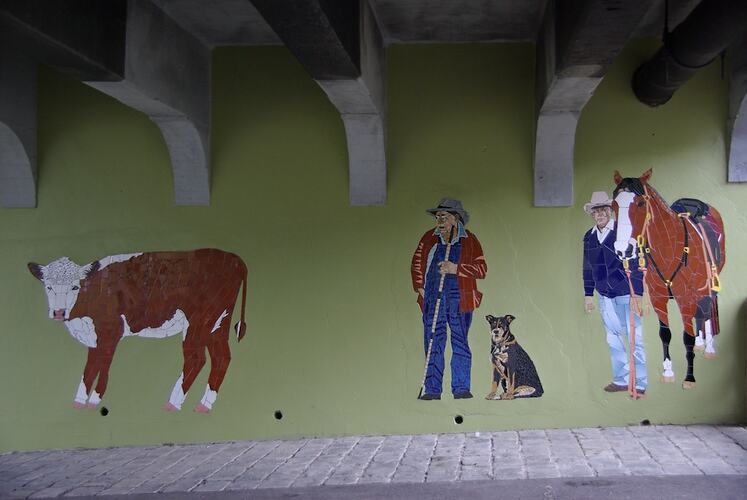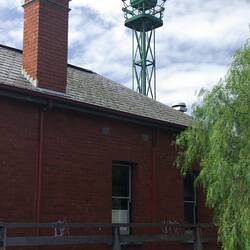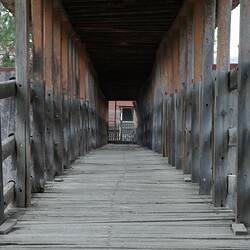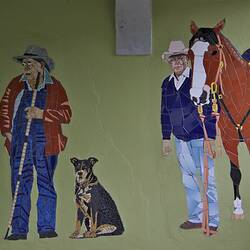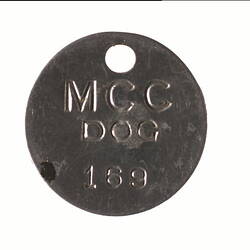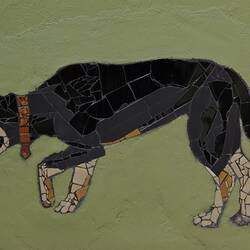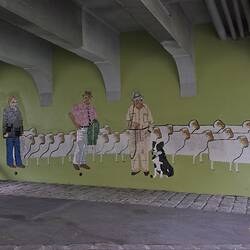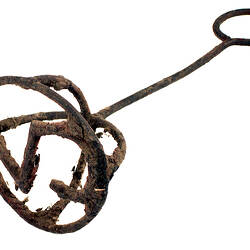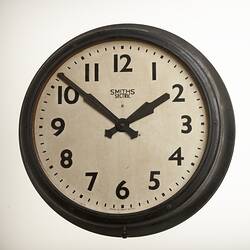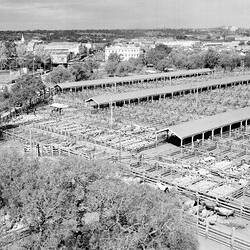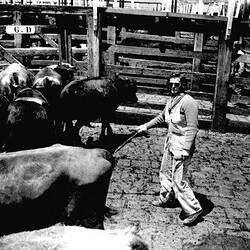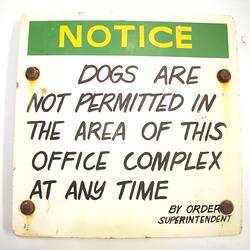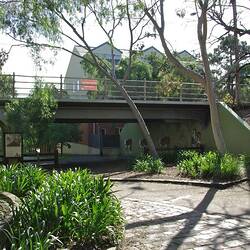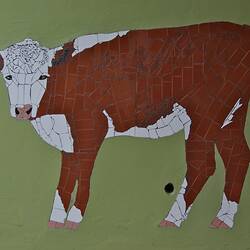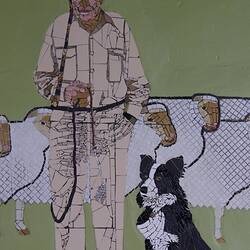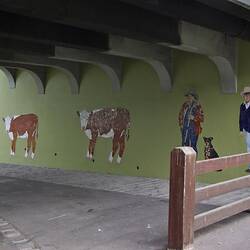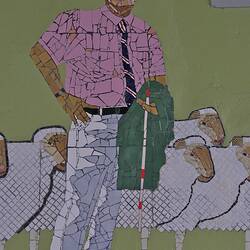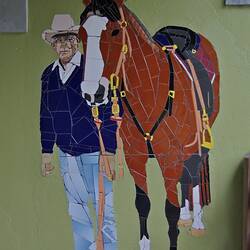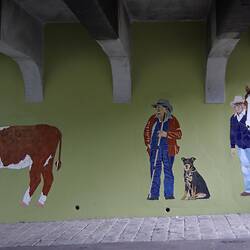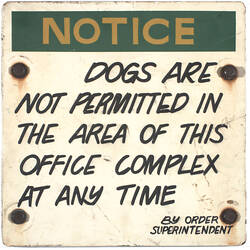The poem "Reminiscing" was written by 'The Stockman's Friend' at the close of the 20th Century and recited on 6 May 1998 at an evening to mark the closure of the Elgin Street Saleyards in Wodonga, Victoria. Through casual, day to day language "Reminiscing" gives accounts of local identities, details daily routines and establishes long standing connections with other saleyards such as Newmarket.
Written in a classic, lyrical, bush-ballad style, "Reminiscing" follows the long tradition of relating anecdotes and tales associated with the itinerant and rebellious spirit of drovers and stockmen. Throughout Australia's literary history, the Bush Ballad has contributed to the poetic construction of a national identity. It portrays a unique cast of heroes with assumed common destinies and interests.
In both literary form and through the process of re-telling, the Bush Ballad or Bush Poem is deeply embedded within Australian culture. It derives its power from the network of cultural contexts that it references and has a way of communicating the commonplace and ordinariness of life and language. The Bush Ballad can be seen as a discourse of a community through the simple communication of feelings and ideas; the context provided by aspects of Australian pioneering mythology and folklore.
Shaped by the conditions of working class life, the poetry within the Newmarket Collection must be viewed in the context of its creation. It is neither an experience of literary grandeur nor eminence, and was never written to fulfil such criteria. Written as a form of entertainment, primarily to be recited aloud, these poems filled cultural spaces now taken up by television or radio. Poetry such as this was shared with mates, sitting in the pub after a long hard day or in the cold frosty mornings when work started long before daylight, the oral tradition of sharing poetry and stories formed an intricate part of the social dynamic.
Defined by a strong sense of collectivity, the poetry aims to portray common experiences and a sense of community and environment. The Newmarket Poetry reflects the culture, values and language of life at the Saleyards. It is the ordinary and everyday aspect of life and language that the poetry represents.
Reminiscing
The Stockman's Friend, 6 May 1998
We are sitting on the Sugarloaf as the words come loud and clear,
The breeze is coming from the east and this is what we hear.
You have heard the tales of great stock sales that have been put to verse and song,
Tales from Old Newmarket and later Dandenong.
Wodonga had its Saleyards that served the country well,
To the saleyards in Elgin Street we have bid a sad farewell.
But a dedicated band of people would not let his era pass,
So they conjured up an evening to the stalwarts of the past.
The stockmen came to reminisce, their memories to relive,
The tales of their experiences to the crowded hall did give.
The time is nearing eight o'clock on a Tuesday morn,
The Superintendent standing there a time piece in his hand.
Then we hear his whistle shrill the action now has started,
The sale is underway.
Kilpatrick is on the walk his cane is held aloft,
We hear, the bid is on the gate, the bid is out the back,
The bids keep coming fast.
Kilatrick brings his cane down bang; sold to Angliss.
Ted Murphy is selling now, his hand cupped to his ear.
He is taking bids from out the sky or even out the back,
Till cautioned by an angry buyer,
Murph replied "I am only taking up the slack."
The Bull sale is over and the crowd is on the move
Down the race to the chopper pens the buyers to the fore,
The yardmen have yarded up a thousand head or more.
Once the pride of dairy herds but now their day is done,
Ending up as sausages or a hotdog in a bun.
Upon the walk we have a man who anyone could tell
No singles or arguments but pen by pen he would go.
He would have his sale completed not fearful of the bell.
We talk about Lang Peterkin, by Jove this man could sell,
The fat pens all filled with cattle
From pastures lush and green,
The primest of prime cattle that one has ever seen.
Upon the walk we have the men
Who through the years have learned to ply their trade,
Upon the sale's completion another sale is made.
There was Stansfield, Bottrel and many, many more
Not forgetting the Farmers and Graziers' man this jolly Wal Treloar.
Then there was Evans with his cultured voice
Who could be heard above the din,
But any man who ruffled John committed mortal sin.
The store sale is on in earnest the pens not so far away
The Dealers stand about getting ready for the fray.
There was Dalton, Bill Weidner and not forgetting Coyle,
The fellows knew they had a bargain when they saw the hammer fall.
Then we have our veteran stockmen who stood both straight and tall,
These men have hung their bridles up and put their spurs away.
They gaze into the distance and think of the far off yesterday.
The one who bought the horses down a man named Jim McGrath,
But McGrath has got a passion for things both great and small,
He has a dozen stockwhips which hang upon the wall.
They were made by master craftsmen these whips upon the wall
These whips he handles fondly to feel the lash's gentle fall.
Our Nuge has passed away and met St. Peter at the Gate,
"And who are you?" St. Peter asked.
"My name is Nuge Minogue, Sir, I am a droving man.
I come here from down below, I carry neither sway nor roll.
I have tried to do things right, I tried to do no wrong.
I can get a bed in any home from here to Corryong."
St. Peter smiled and said to Nuge,
"Get your whip, get on your horse and move the mob along."
Oh! What tales these old top rails on the Saleyards could relate,
To the rise and fall of cattle prices, the fickle hand of fate.
The droving plains are fading into the dim and distant past,
The way that progress travels we knew it couldn't last.
The double-deck trailers with their mighty diesel's roar,
No more will we see the mobs come down of two thousand head or more.
Our reminiscing is over and we are back on Earth,
To the speakers and the ladies who provided this repast,
To the stockmen and the ladies of the Dining Rooms,
And those who worked around the yards,
You have made our night a great success.
To you we give our kindest of kind regards.
More Information
-
Keywords
Cultures and histories : Melbourne and Victoria, agricultural industry, country life, city & town life, Working Lives
-
Authors
-
Article types
